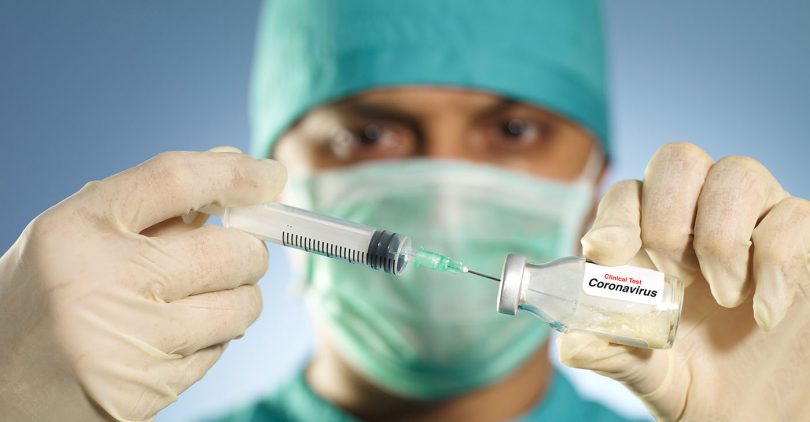By Stacy M. Brown
NNPA Senior National
Correspondent
News that Pfizer and BioNTech’s announcement that their coronavirus vaccine was more than 90 percent effective in preventing COVID-19 among those without previous infection arrives as the United States continues to realize record-breaking new cases.
For the first time on Thursday, November 12, the country surpassed 150,000 new coronavirus cases in a single day.
The total number of cases soared past 10.5 million, according to Johns Hopkins University.
More than 242,000 people have died in the United States since the declaration of the outbreak of the pandemic in March. Health officials have expressed that the new vaccine offers real hope for the future.

“It is a great day for science and humanity. The first set of results from our Phase 3 COVID-19 vaccine trial provides the initial evidence of our vaccine’s ability to prevent COVID-19,” Dr. Albert Bourla, Pfizer Chairman and CEO, offered in a news release.
“We are reaching this critical milestone in our vaccine development program at a time when the world needs it most, with infection rates setting new records, hospitals nearing over-capacity, and economies struggling to reopen,” Dr. Bourla remarked.
NDG 11/12: Supreme Court scheduled to hear arguments that will determine the fate of the Affordable Care Act
Dr. Kevin Williams, the Chief Medical Officer for Pfizer’s Rare Disease unit, periodically writes a column in the Black Press to help keep the African American community informed.
According to information posted on the CDC’s website, clinical development is a three-phase process.
During Phase I, small groups of people receive the trial vaccine.
NDG 10/29: Why the 2020 vote matters more than ever
In Phase II, the clinical study is expanded, and vaccine is given to people who have characteristics (such as age and physical health) similar to those for whom the new vaccine is intended.
In Phase III, the vaccine is given to thousands of people and tested for efficacy and safety.
Many vaccines undergo Phase IV formal, ongoing studies after the vaccine is approved and licensed.
NDG 10/22: Domestic terror arrests in Michigan heighten alarm of right wing violence
Pfizer’s vaccine is the first in the United States to generate late-stage data.
An analysis of individuals that received two injections of the vaccine, spaced three weeks apart, revealed more than 90 percent fewer cases of symptomatic COVID-19 when compared to those who received the placebo.
The results are significant because health and science experts have stated that they expected a vaccine to yield an effective rate of no more than 70 percent.
In spite of this good news, many in the African American community continue to take a wait-and-see approach.
“Somehow, scientific, education and community leaders must reassure a skeptical community of color that the vaccine will help and protect them,” said Gina Harper.
She created an urban garden in New York after growing up on a farm in Oklahoma.
“Perhaps the best way would be to prove the point by exemplifying members of the Black community who have taken the vaccine and remained healthy,” Harper remarked.
The Pfizer vaccine clinical trial “went out of its way in their recruitment and enlarged their initial population of 30,000 to almost 44,000 to recruit more people of color,” stated Dale Yuzuki, a biotech executive and author of “COVID-19: From Chaos to Cure. The Biology Behind the Fight Against the Novel Coronavirus.”
Dr. James E.K. Hildreth, one of the world’s foremost immunologists and president and CEO of Meharry Medical College in Nashville, Tenn., is a recent appointee to the U.S. Food and Drug Administration’s commission that will ultimately approve the Pfizer vaccine and any others.
Hildreth, an African American, insists that any vaccine must have the confidence of Black people.
“I’ve made the decision that I’m going to participate in one of the vaccine trials. The trust issue cannot be overstated,” Dr. Hildreth said.
“We have to have more trusted messengers and more trusted opinion leaders to make this work.”





[…] Source link […]
[…] NDG 11/19: New Coronavirus vaccine requires ‘trust’ of African American community […]
[…] NDG 11/19: New Coronavirus vaccine requires ‘trust’ of African American community […]
[…] NDG 11/19: New Coronavirus vaccine requires ‘trust’ of African American community […]
[…] NDG 11/19: New Coronavirus vaccine requires ‘trust’ of African American community […]
[…] NDG 11/26: New coronavirus vaccine requires ‘trust’ of the African American community […]
[…] NDG 11/26: New coronavirus vaccine requires ‘trust’ of the African American community […]
[…] NDG 11/26: New coronavirus vaccine requires ‘trust’ of the African American community […]
[…] NDG 11/26: New coronavirus vaccine requires ‘trust’ of the African American community […]
[…] NDG 11/26: New coronavirus vaccine requires ‘trust’ of the African American community […]
[…] NDG 11/26: New coronavirus vaccine requires ‘trust’ of the African American community […]
[…] NDG 11/26: New coronavirus vaccine requires ‘trust’ of the African American community […]
[…] NDG 11/26: New coronavirus vaccine requires ‘trust’ of the African American community […]
[…] NDG 11/26: New coronavirus vaccine requires ‘trust’ of the African American community […]